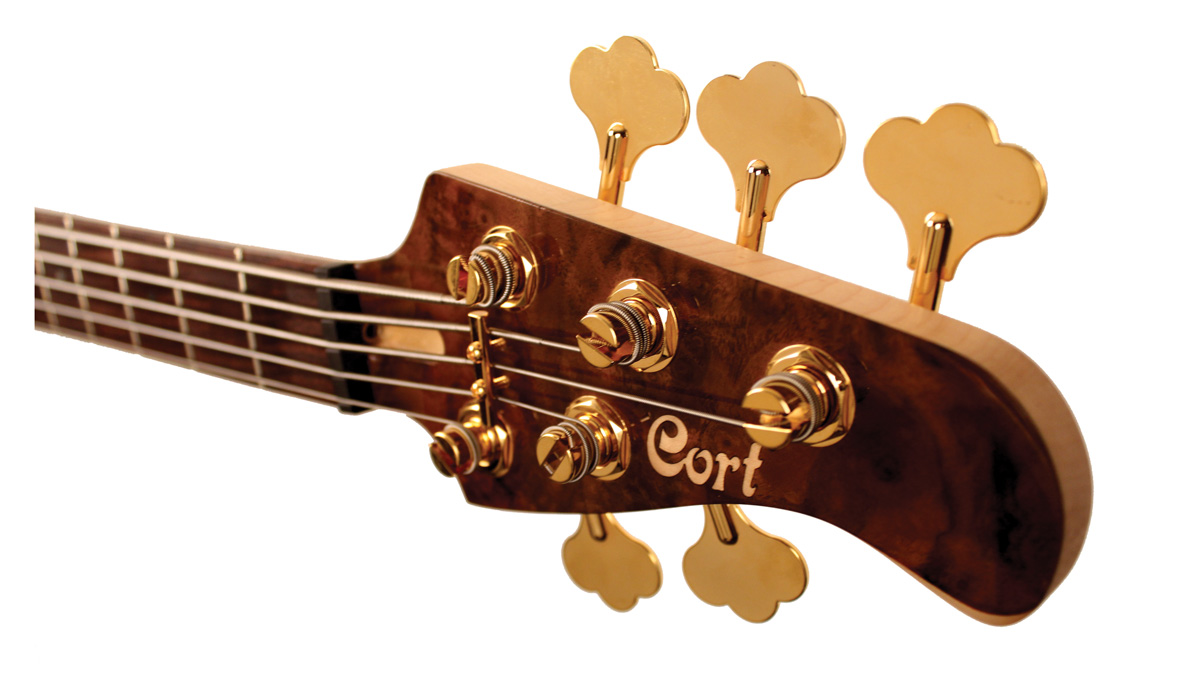MusicRadar Verdict
Excellent bass for high-register notes and soloing.
Pros
- +
High-quality materials.
Cons
- -
Tone range is a little narrow.
MusicRadar's got your back
Jeff Berlin is known for several things - his forthright views on music education, for once being the possessor of the best moustache in bass (apart from Geezer Butler), and for his astounding fluency on the bass guitar in a variety of solo and band contexts. The third of these is our focus today.
Any bass bearing Jeff’s name needs to enable his smooth chordal work, expert staccato picking and fluid soloing, all of which Cort’s existing Rithimic four-string can do. How does the bass fare when extended with a low B-string?
Build
The Rithimic V occupies a not-cheap, not-that-expensive price point, manufactured from top-quality components but built in Indonesia. Aside from its tasty walnut burl top, the woods are standard - alder for the body, maple for the neck, rosewood for the fretboard - but the Bartolini pickups, Hipshot Ultralite tuners and Babicz Full Contact Hardware bridge are anything but, dripping with quality and a certain level of bling thanks to their black and gold finish. As per Jeff’s stated preferences, this is a passive, bolt-on instrument with a simple control set - one volume, one balance, one tone. Much of the Rithimic’s tonal versatility, therefore, will need to come from your fingers.

Despite its luxurious colour scheme, this bass is pretty traditional in feel and spec. The controls layout is tried and tested, the elephant-ear tuners work solidly and well, and the chamfering to the body is minimal rather than expansive, making few concessions to the ‘amply-nourished’ bassist.
There are only 21 frets, which is a tad unexpected given Jeff’s unearthly ability when it comes to high-register soloing, but it’s as we said above - the job of making this bass sing is yours and yours alone.
Sounds
We’re so used to Death Star-like basses with pulverising active electronics that it’s a pleasant surprise when we get hold of an old-fashioned passive instrument. It’s refreshing when a balance and tone are the only controls we have to hand, and navigating a usable range of sounds is solely down to our technique, or lack of it as the case may be.
We approach the low B with plenty of attack, fingers anchored to the rear pickup in an attempt to emulate Jeff’s taut staccato, and we’re rewarded with that economical- sounding tone that all the best jazz fusion bassists seemingly magic out of thin air. The Rithimic’s natural tone is thinner and more fragile than that of a turbocharged active bass for obvious reasons, so we spend time on our phrasing. Rolling on the tone for some extra thickness, we switch to chords and a floating thumb, finding a sweet spot somewhere in the middle of the tone range, which -also for obvious reasons - really isn’t that wide. Glassy highs are here, as a few pops reveal, but an earth-shaking low end absolutely is not, so look elsewhere if that’s what you need.
Want all the hottest music and gear news, reviews, deals, features and more, direct to your inbox? Sign up here.
For a grand plus change, this is a wholly decent instrument. The components, attention to build detail and playability are exactly as we would wish. Sure, it would have been nice to have some weightier low frequencies at our disposal, but that’s not what its creator requires - and you can always plug into a preamp if a bigger bottom end is required. We enjoyed playing the Rithimic, and we’re confident that you will too.
